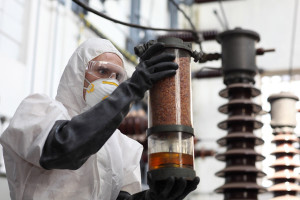
Nuclear Engineering is the design and application of various technologies that harness nuclear energy in a productive way.
What Does a Nuclear Engineer Do?
Nuclear Engineers perform a number of different tasks depending on their industry of choice. Many design nuclear equipment that is used in power plants, medical machinery, and other devices. They may also operate and observe the operation of advanced nuclear machinery. In addition, they may be responsible for monitoring nuclear equipment and handling any emergency situations quickly and adeptly. Nuclear Engineers that work for universities may study bigger and better ways to utilize nuclear energy.
Where Does a Nuclear Engineer Work?
Nuclear Engineers works in a variety of different settings depending on what industry they work in. Many spend the majority of their time in offices, usually utilizing computers to analyze data, design new equipment for various industries, or monitor equipment. Those working for private power companies may find themselves working on the floor of the plant. Engineers employed at research universities will work in a laboratory environment analyzing data and utilizing advanced equipment to study the behavior of nuclear energy.
Most Nuclear Engineers work a full-time schedule, but this may vary at times depending on where they are employed.
What Is the average Nuclear Engineer Salary?
Nuclear Engineers earned a median salary of $116,140 as of May 2020. The top 10% in the field earned more than $185,550 during this time.*
Most of these specialized engineers work for power companies, but others work for the Federal government and private research facilities.
What Is the Job Demand for Nuclear Engineers?
The job demand for Nuclear Engineers is expected to decline about 8% between 2020 and 2030.*
What Are the Education Requirements to Become a Nuclear Engineer?
Nuclear Engineers must have a bachelor's degree from an ABET-accredited university, typically in nuclear engineering. Gaining lab and fieldwork during school will help the student gain the most experience during their time at school.
Many Nuclear Engineers go on to earn a master's degree, which allows them to work in an academic environment as a teacher and researcher. Some universities even offer 5-year programs that will earn students both a bachelor's degree and master's degree at once.
Other Degrees Related to Nuclear Engineering
What Kind of Societies and Professional Organizations Do Nuclear Engineers Have?
Nuclear Engineers and those who wish to enter the field can also browse through these government websites and organizations for valuable resources:
- American Nuclear Society (ANS) is a non-profit organization that works towards promoting the field of nuclear technology. It promotes the professional development of everyone working in the nuclear sciences. ANS also allows everyone to share knowledge across the industry through events and publications.
- World Nuclear Association (WNA) is an international professional organization that aims to promote nuclear energy and provide support to nuclear industries. Becoming a member of this organization allows Nuclear Engineers to stay aware of upcoming trends in the industry and remain updated on best practices through international forums, informational papers, and the industry-specific magazine World Nuclear News.
- North American Young Generation in Nuclear (NAYGN) is an organization dedicated to helping young professionals in the Nuclear industry advance in their careers. This organization provides numerous networking opportunities through committees, local chapters, and conferences. In addition, they offer a number of professional awards and informative documents that allow young Nuclear Engineers to have an advantage over their competitors.
*2020 US Bureau of Labor Statistics salary figures and job growth projections for nuclear engineers reflect national data not school-specific information. Conditions in your area may vary. Data accessed September 2021.





